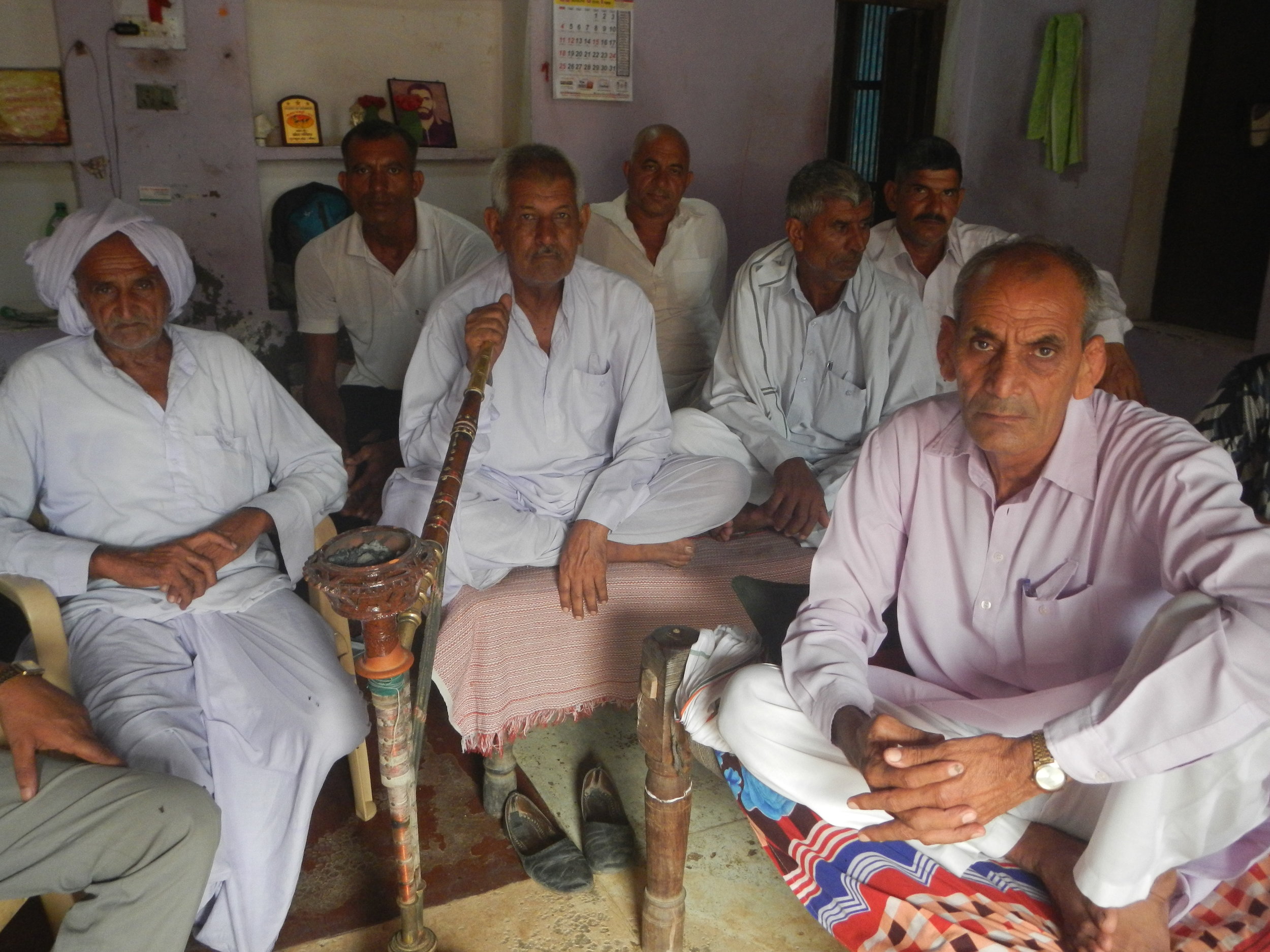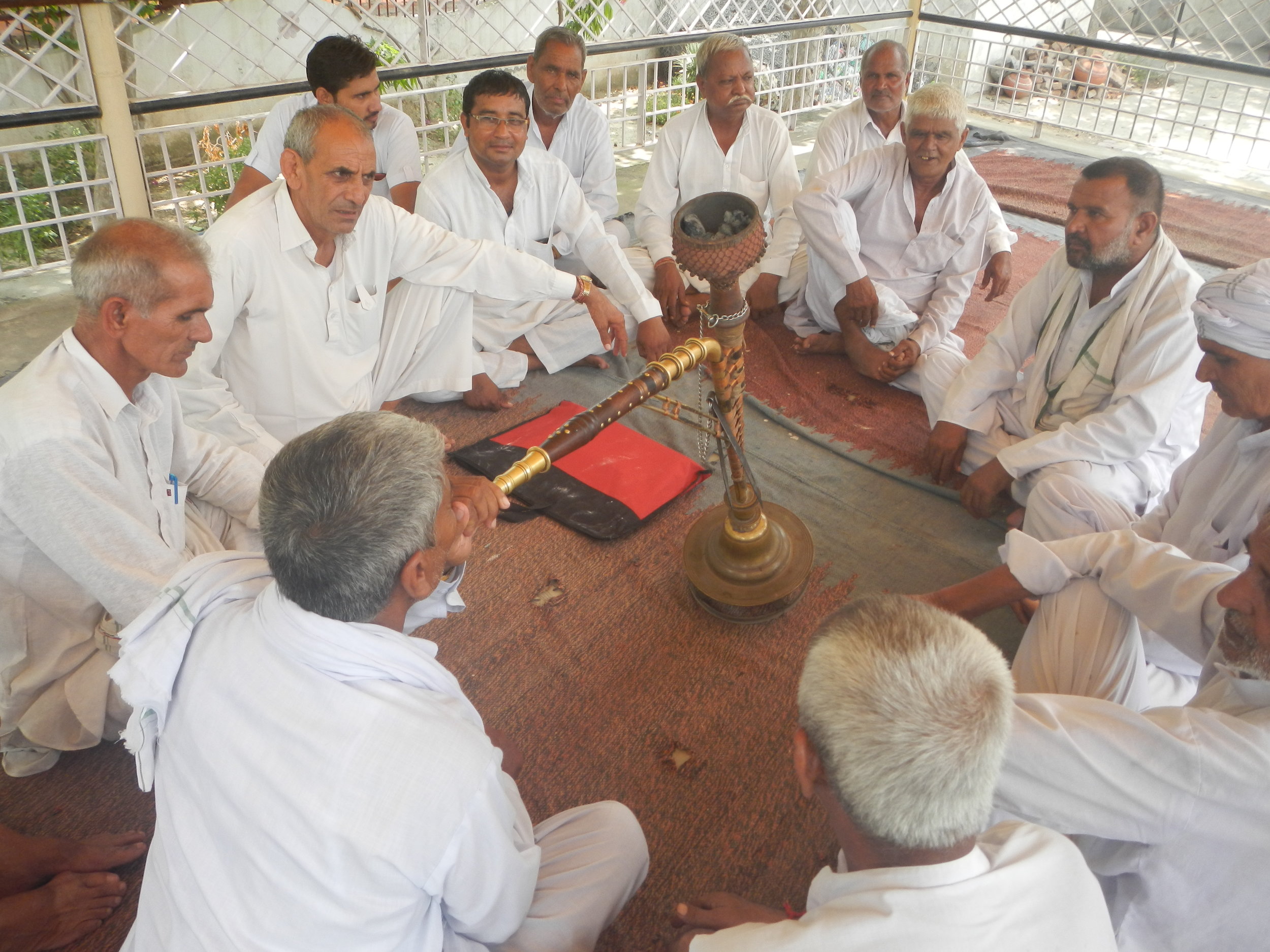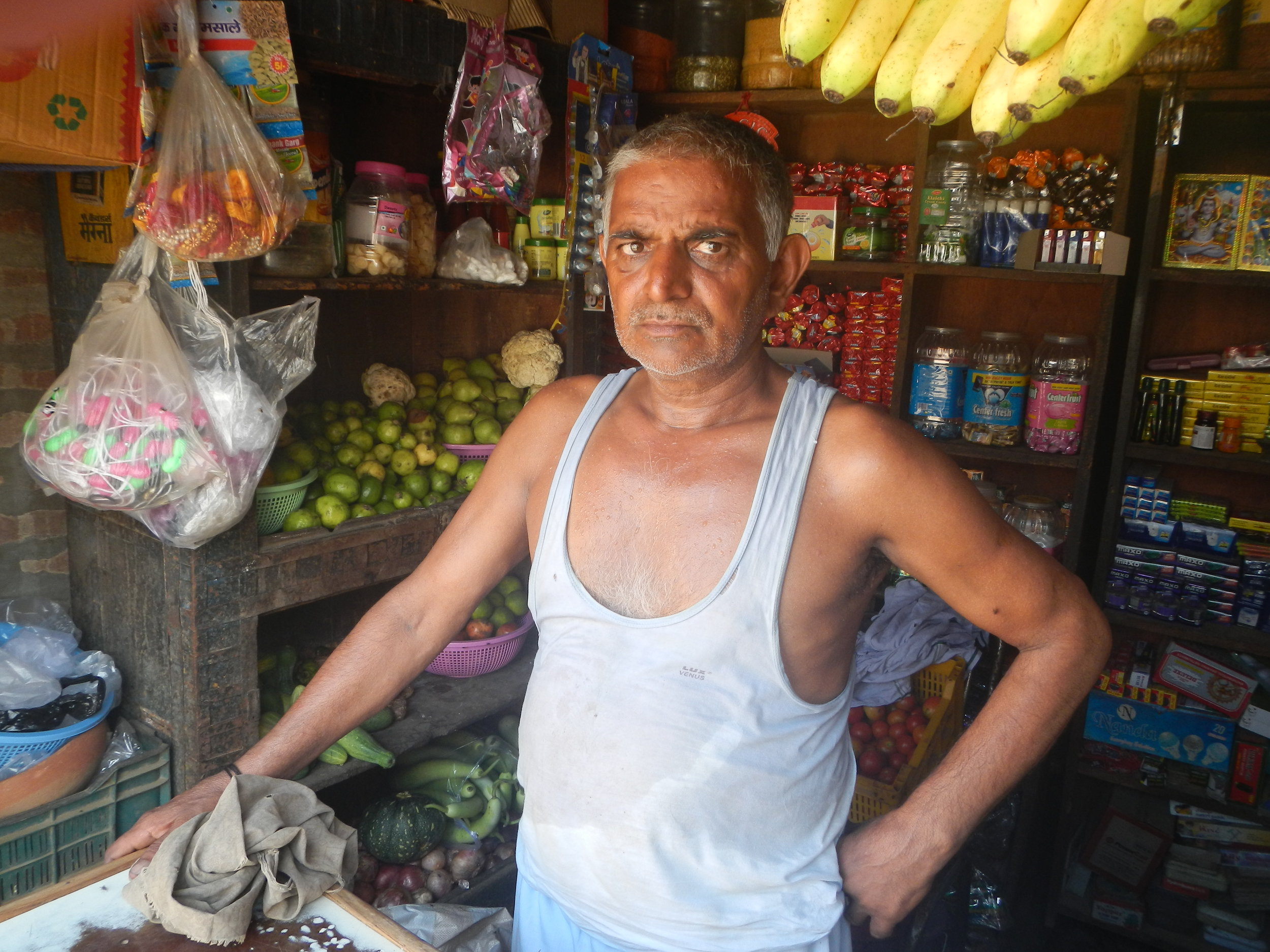These 24 Indian villages are eliminating caste names to fight discrimination
Satbir Pahalwan (right), head of Khera Khap Panchayat, along with other locals at his village home in Haryana, India. Photo by Priyadarshini Sen.
JIND/HISAR, India — Drawing puffs of smoke from a brass-bottomed hookah at his village home in Barsola, about a four-hour drive north from Delhi, Satbir Pahalwan recounts the caste-based violence that rocked a nearby village nine years ago.
“Eighteen houses of low-caste Dalits were set ablaze by an irate mob,” said Pahalwan, the head of Khera Khap, a community organization of 24 villages in the North Indian state of Haryana.
Across Barsola, the wounds are still raw and memories of the village Mirchpur’s atrocities haven’t faded.
But in a momentous decision this summer, Pahalwan’s khap panchayat—a type of village council that wields considerable social influence in North India, decided it would end the deathly hold of caste on their community, and with it, their centuries-old tradition.
The villagers agreed they would replace caste-identifying surnames with those of their 24 villages instead. They even decided to strip their postal addresses, name plates, social media accounts and vehicle windshields of caste markers.
Villagers gather for a large panchayat meeting in the Jind district of Haryana, India. Photo by Priyadarshini Sen.
India’s caste system—among the world’s oldest forms of social stratification—has bestowed privileges on upper caste Hindus while institutionalizing repression of the low castes. For centuries, the caste system has dictated what jobs are available to who, who can live where, where one can eat, who can marry who, and many other facets of life. The low castes live in constant fear of being publicly humiliated and persecuted by upper-caste Hindus seeking to put them in the right place. Despite being criticized by many as regressive and unjust, the discrimination has remained virtually unchanged, especially outside India’s megacities. Only about 5 percent of Hindus marry outside their caste (and only five percent of women choose their husbands), according to the India Human Development Survey.
Rural communities usually arrange their homes and streets based on caste, with segregated colonies. In some places, water wells and food are not shared.
“Gandhi and Ambedkar had a different vision of India from what we have today,” said Pahalwan, pointing to his room’s walls studded with photographs of India’s lofty political leaders and social reformers. “Discriminations based on caste and religion must end.”
In Haryana, an entrenched caste divide has crippled society, and khap panchayats are known to mete out punishments to couples who transgress social norms.
The khaps order and carry out honor killings often for infidelity, inter-caste relationships and pre-marital sex. They reason that a family’s honor is tied to their women’s chastity.
In 2010, a local Haryana court assigned the death penalty to five men for murdering a young inter-caste couple on the orders of a khap panchayat.
“It is this idea that we want to break,” said Pahalwan, who led a meeting on a sweltering August afternoon with representatives from 10 quasi-judicial bodies across Jind District.
“We don’t advocate honor killings and are all for inter-caste marriages with the family’s consent,” the kera khap panchayat head announced.
No government support
Pahalwan’s desire for an open and caste-free society cemented when he saw the power imbalance in rural communities while serving in a rifle regiment of the Indian army for 20 years.
“I saw many discriminatory social practices and ostracization faced by the low castes,” Pahalwan said. He had also been exposed to the writings of Dr. Babasaheb Ambedkar, the architect of India’s constitution and a Dalit who campaigned vehemently against caste-based injustices.
Galvanized by Pahalwan’s vision, Khera Khap’s residents got together to set up 24 village committees that will propagate the message of a caste-free society.
The committee members will go door-to-door in their villages to persuade families to drop their caste-identifying last names and encourage kinship.
The villagers have said that this move has been lauded by many low caste groups, khap panchayats and district officials. The BJP government has given them no acknowledgement or support.
Udayvir Singh, a schoolteacher in Barsola village, believes political leaders stir up rural populations along caste and religious lines to seek votes.
“Caste-based violence and persecutions have spiraled under the right-wing BJP government,” he said. “Some leaders interfere in the internal affairs of khap panchayats for political gains.”
Surendra Barsola, another resident, believes government representatives should draw from diverse religious texts such as one of the Hindus’ holy books the Bhagavad Gita, the Quran from Islam and the Bible from Christianity to advocate brotherhood and tolerance.
In 2016, Haryana’s chief minister Manohar Lal Khattar had said he would renounce his surname after agitations by a traditionally agricultural low-caste community left 30 people dead across the state.
The former Haryana chief minister Om Prakash Chautala had also relinquished his last name to give out the message that he represented his whole neighborhood instead of any caste.
Increasing caste-based violence
Villagers complain that caste-based atrocities have increased over the last ten years.
“Our community could be the starting point of rooting out this social evil,” says Udayvir Singh, who hopes for a society where the low castes and religious minorities have equal access to educational, financial and social opportunities.
The decision to go caste-less has not gone without opposition from within the community and outside.
The president of Khatkar sub-caste khap, Dalel Singh, believes the 36 castes across the Khera Khap Panchayat have their unique identities, which can’t ever be undone.
“Will Prime Minister Narendra Modi attend Rahul Gandhi’s meeting? In the same way, we can’t be on a level field with people who oppose the caste system.”
Subeh Deen, a Muslim shopkeeper from Barsola village, believes dropping last names will not encourage inter-caste or inter-religious marriages in pastoral settings.
“How can marriages be solemnized without taking cultural differences into account?” he said. “If couples want to marry outside of their caste or religion, they can move to the big cities.”
Subeh Deen, a Muslim shopkeeper, at his store in Barsola village in Haryana, India. Photo by Priyadarshini Sen.
Dalit activists, too, share the same skepticism.
Dinesh Khapar, a Dalit activist in Jind, believes village panchayats are the gatekeepers of casteism, and only government intervention can alter the ground reality.
“It was so easy for the BJP to scrap Article 370 that granted special status to Jammu and Kashmir,” Khapar said. “Why can’t the government similarly eradicate caste-based discriminations in one stroke?”
Even though untouchability was outlawed when India adopted its constitution in 1950, abuses against low castes were so pervasive that the government passed the Prevention of Atrocities Act in 1989. It was meant for the social inclusion of Dalits, but the Act could not entirely regulate offences committed against them. The laws designed to protect the low castes are lax or even redundant in many parts of India. Little recourse is available to the victims of caste-based violence carried out with impunity.
Rajat Kalsan, a national coordinator for the NGO National Alliance for Dalit Human Rights in Jind, believes this move is simply a damage-control exercise by the khap panchayats, which want to salvage their reputation as social cooperatives.
Drawing from historical efforts
But still, the signs of change are palpable even if only tentative steps have been taken.
Barely 40 miles away in Rohtak, the Sabharwal Khap, which is a highly patriarchal community organization exerting significant social influence, has recently for the first time recruited five women to educate locals about the importance of eradicating caste-based discriminations and are working toward a more inclusive society.
“Politicians rake up issues like Ram Mandir in Ayodhya to polarize voters, but caste is the bane that we need to eradicate,” says Minu Sabharwal, a member of the Sabharwal Khap in Rohtak.
In early eighteenth-century India, one of the spiritual masters of the Sikhs, Guru Gobind Singh, institutionalized the principle of equality in Sikhism regardless of one’s caste or gender. Mounting a frontal attack on Hindus’ citadel of caste, Singh said the fundamental assumption of the caste ideology was that men are not equal. Yet, the caste system could not be uprooted since it was so entrenched in India.
In the early twentieth century, many Sikh families of Punjab who were bogged down by the casteism that prevailed in society, adopted their village names for a more equal social order.
“We are taking a leaf out of that experiment,” says Samudra Singh Phour, the press secretary of Majra Khap Panchayat in Jind district.
“If less educated people like us can take such a bold step, how difficult is it for the courts to dispense justice?” he asked.
Back in his village home, Satbir Pahalwan hopes this trigger for change will have a ripple effect.
“The caste system is riddled with problems, but our strength lies in our unity,” says Pahalwan.
“If the winds of change sweep over other parts of India, we’ll emerge more humane as a nation.”
Priyadarshini Sen is an independent journalist based in New Delhi



